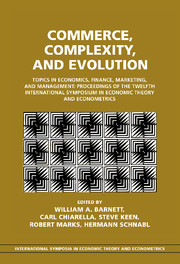 Commerce, Complexity, and Evolution
Commerce, Complexity, and Evolution Book contents
- Frontmatter
- Contents
- Series editor's preface
- Volume editors' preface
- Editors
- List of contributors
- I Philosophical and methodological implications of complexity and evolution in economic systems
- II Finance and the macroeconomy
- III Market and sectoral dynamics
- 10 Evolutionary patterns of multisectoral growth dynamics
- 11 The detection of evolutionary change in nonlinear economic processes: a new statistical methodology
- 12 Ergodic chaos in a piecewise linear cobweb model
- 13 The cobweb model and a modified genetic algorithm
- 14 The convergence of genetic learning algorithms, with particular reference to recent cobweb models
- IV Marketing and interdependent behavior
14 - The convergence of genetic learning algorithms, with particular reference to recent cobweb models
Published online by Cambridge University Press: 05 December 2011
- Frontmatter
- Contents
- Series editor's preface
- Volume editors' preface
- Editors
- List of contributors
- I Philosophical and methodological implications of complexity and evolution in economic systems
- II Finance and the macroeconomy
- III Market and sectoral dynamics
- 10 Evolutionary patterns of multisectoral growth dynamics
- 11 The detection of evolutionary change in nonlinear economic processes: a new statistical methodology
- 12 Ergodic chaos in a piecewise linear cobweb model
- 13 The cobweb model and a modified genetic algorithm
- 14 The convergence of genetic learning algorithms, with particular reference to recent cobweb models
- IV Marketing and interdependent behavior
Summary
Since the publication of the seminal monograph of Holland (1975), genetic algorithms (GAs) have been used extensively to study the evolution of complex systems that embody learning behavior. The modeling power of GAs is very great, and the bibliography of Dawid's recent book (1996) mentions several other books and many research articles in this area and the closely allied field of simulated annealing. However, as Dawid commented, economists tend to use rather simple mathematical models to describe the learning behavior of rational agents so as to keep to situations that are analytically tractable.
A complication for applications in economics is that the payoff to an agent in even a single-commodity market depends on the actions of the rest of that market, that is, the fitness function in the GA is state dependent. Dawid appears to have been the first to have carried out a mathematical analysis of a GA with a state-dependent fitness function, which he does by using a modification of a Markov chain model of Nix and Yose (1992).
Dawid's primary result is that as the mutation probability in a GA tends to zero, its stationary distribution converges to one in which the probability is concentrated on states that are uniform, that is, all strings in the population have equal bit values. He argues further that uniform states are the appropriate ones to exhibit a natural economic equilibrium.
This result may be viewed as a refinement of a theorem of Rudolph (1994), who shows that a GA with strictly positive mutation probability does not converge to any uniform state.
- Type
- Chapter
- Information
- Commerce, Complexity, and EvolutionTopics in Economics, Finance, Marketing, and Management: Proceedings of the Twelfth International Symposium in Economic Theory and Econometrics, pp. 277 - 288Publisher: Cambridge University PressPrint publication year: 2000


